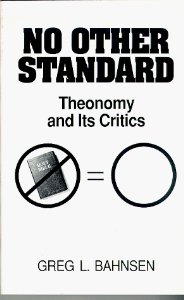By Chuks Ezemando, Vicar of the Anglican Church, Lagos, Nigeria
AUTHOR: Dr. Greg L. Bahnsen
Year published & size: 1991 / 351 pages
Click here to go to the WEB SITE (to download free):
Against Antinomianism
Dr. Greg L. Bahnsen focused on the biblical bases for comprehensive theonomy; the Laws of Moses as applied in Christ as the basis for individual, family, Church and societal sanctification; powered by the Holy Spirit. Dr. Bahnsen actually wrote against the vice of antinomianism. He promoted comprehensive pro-nomianism. Dr. Bahnsen insisted that whoever hears Moses will hear Christ, since Christians should honor the law of Moses just because the words of Christ require us to do so. Theonomy is not a matter of hearing Moses instead of Christ, but rather hearing Moses because of Christ. To show that the pro-nomianism of the Apostles went beyond the individual, family and church he quoted examples of New Testament citations of Moses’ Civil Laws:
Paul appealed to the extra-decalogical prohibition against incest (1 Cor. 5:1). The case law against homosexuality was upheld in the New Testament (1 Cor. 9:9). James applied the judicial law about prompt payment of one’s employees (5:4). The important New Testament injunctions about not avenging oneself, about going to an offending brother, and about caring for one’s enemies are all taken from the judicial laws of the Old Testament (Rom. 12:19; Matt. 18:15; Rom. 12:20; Matt. 5:44). You see, the New Testament cites the judicial laws of the Old Testament too often, and without apology or disclaimer, to accept at face value the bold claim of theonomic critics that these laws have been abolished by the work of Christ or the coming of the Holy Spirit. ‘Not one jot or tittle will pass away from the law until heaven and earth pass away’ (Matt. 5:18).
Dr. Bahnsen gave further examples, thus: “Isn’t condemning a man without a hearing a civil matter (John 7:51)? Isn’t murder and its judgment a ‘reference to’ the civil aspect of the law (Matt. 5:21)? Isn’t ‘an eye for an eye’ a civil aspect of the law (Matt. 5:38)? Isn’t the execution of incorrigible delinquents a civil aspect of the law (Matt. 15:4)? Aren’t things ‘worthy of death’ charged by the Jews a reference to civil aspects of the law (Acts 25:7-8, 11)? Isn’t theft a civil matter (Rom. 13:9)? Extortion (1 Cor. 5:10; 6:10)? defrauding of salary (Jas. 5:4)? Isn’t submission to civil rulers a ‘civil aspect’ of God’s law (1 Pet. 2:13-17)? Our examples could go on and on, but the point should be made by now… The conflict between the law of the political Beast and the law of God is a key motif in Revelation (12:17; 13:16-17; 141, 9, 12; cf Deut. 6:8).”
He went on to explain how antinomianism – especially in legal issues – inevitably results in double standards. God does not have a double standard of justice in society. Rape is wrong, whether in Israel, Nineveh, or New York. And punishing rapists too leniently or too harshly is wrong for magistrates, whether in Israel, Nineveh, or New York. If God has not revealed objective standards of justice for crime and punishment, then magistrates cannot genuinely be avengers of God’s wrath against evildoers. They could only avenge their human anger against those who displease them, without any assurance that genuine evildoers are receiving a just recompense. In that case the “sword” would truly be wielded “in vain” (Rom. 13:4), and good people would have a real reason to fear (v. 3). The criminal standards of the Old Testament are God’s objective standard of public justice, prescribing for every transgression its “just recompense of reward” (Heb. 2:2) and executing only those who do things “worthy of death” (Acts 25:11; cf Deut. 21:22) – even as the pagans know (Rom. 1:32; 2:14-15).
He applied God’s law to judges (Acts 23:3; cf Leviticus 19: 15). He endorsed God’s prohibition of reviling rulers (Acts 23:5; cf. Exodus 22:28). In dealing with social relationships and conditions he appealed to the Mosaic case laws regarding incest (1 Corinthians 5:1; cf. Leviticus 18:8), regarding homosexuality (Romans 1:27, 32; cf. Leviticus 20: 13), and regarding fair treatment of slaves (Colossians 4:1; Cf Leviticus 25:43, 53). He endorsed the use of God’s law to curb social crimes like killing one’s parents, kidnapping, homosexuality, perjury, etc. (1 Timothy 1:8-10). He expected the civil sanctions of God’s law to be applied (Acts 25:11), teaching that civil magistrates must pursue their offices as ‘ministers of God’ (Romans 13:1-4). He indicted the emperor for his ‘lawlessness’ (2 Thessalonians 2:8).
So, contrary to the erroneous position of critics of comprehensive pro-nomianism, the Civil Laws of Moses (as the basis for several New Testament commands), run almost from Matthew to Revelation.



